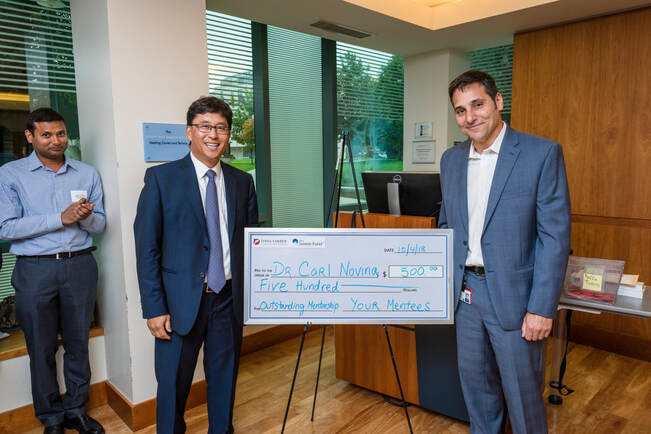Mentorship
I am deeply committed to ensuring thorough training in the scientific process for all members of my lab. I set aside 1 hr/week to meet individually with each member of my lab. My group has a weekly lab group meeting where graduate students and postdoctoral fellows share the results of their research with other members of our group. During the COVID-19 pandemic, lab group meetings have been replaced by weekly manuscript preparatory meetings. These discussions promote team building within my group and help members to understand how their work fits into the goals of each project and the overall trajectory of the lab.
The primary focus of trainees’ work in my lab is to develop skills as independent scientists. My lab has a strong history of developing technologies including microRNA and long non-coding RNA biology reactions in vitro, lentiviral delivery strategies for small RNAs, a platform for non-coding RNA discovery, tools for epigenetic engineering including targeted DNA methylation, and a two-part chimeric antigen receptor (CAR) T cell system that allows for controllable autologous therapies.
Trainees work in a highly collaborative environment in which they use or develop these and other technologies to examine the fundamental processes underlying cancers and bone marrow failure syndromes. Trainees work closely with thought leaders in clinical oncology (Drs. Stephen Hodi, David Reardon, Nikhil Munshi, Ken Anderson and Ursula Matulonis), hematopoiesis (Drs. Colin Sieff, Akiko Shimamura, Harvey Lodish), epigenetics (Drs. Dan Bauer, Marc Ostermeier, Winston Timp), modeling human bone marrow on a chip (Dr. Don Ingber), and engineering cell therapies (Dr. Jerry Ritz), to name a few. Most trainees express interest in using or developing advanced technologies to study disease processes that may also become the basis of therapy – philosophies I actively foster in my lab.
The Novina lab is a supportive training environment for graduate students, postdoctoral and clinical fellows in Harvard-affiliated hospitals. I mentor many students enrolled in BBS, Immunology and Virology Graduate Programs at the Harvard Medical School. From the greater Boston academic community, I also mentor many undergraduate students from the Harvard Faculty of Arts and Sciences (FAS), Boston College, Boston University, Massachusetts College of Pharmacy, and Northeastern University.
In addition to research-based mentoring, I am a committed to teaching the next generation of entrepreneurs and promoting entrepreneurship through engagement with the GSAS Harvard Biotechnology Club. I am a faculty mentor for The Incubator, a division of HBC that teaches the key elements that determine whether and how technologies are developed into drugs. I am also a mentor for the Activate Program, which now has chapters all over the United States, and the faculty course coordinator for the Engage Workshop Series; all programs dedicated to helping members of the HMS community translate and commercialize technologies. These workshops cover skills that aren’t traditionally taught in graduate school, but are helpful for those going into industry, from competitive landscape analysis to pitch deck creation. In addition to the formal programs, I also mentor people from the Incubator program on their own projects and careers, helping them successfully translate their own work. All of these endeavors are dedicated to helping members of the HMS community translate technologies more effectively. While the GSAS Biotech Club is independent of HMS, it is a vital part of the educational experience for translationally-minded trainees.
The primary focus of trainees’ work in my lab is to develop skills as independent scientists. My lab has a strong history of developing technologies including microRNA and long non-coding RNA biology reactions in vitro, lentiviral delivery strategies for small RNAs, a platform for non-coding RNA discovery, tools for epigenetic engineering including targeted DNA methylation, and a two-part chimeric antigen receptor (CAR) T cell system that allows for controllable autologous therapies.
Trainees work in a highly collaborative environment in which they use or develop these and other technologies to examine the fundamental processes underlying cancers and bone marrow failure syndromes. Trainees work closely with thought leaders in clinical oncology (Drs. Stephen Hodi, David Reardon, Nikhil Munshi, Ken Anderson and Ursula Matulonis), hematopoiesis (Drs. Colin Sieff, Akiko Shimamura, Harvey Lodish), epigenetics (Drs. Dan Bauer, Marc Ostermeier, Winston Timp), modeling human bone marrow on a chip (Dr. Don Ingber), and engineering cell therapies (Dr. Jerry Ritz), to name a few. Most trainees express interest in using or developing advanced technologies to study disease processes that may also become the basis of therapy – philosophies I actively foster in my lab.
The Novina lab is a supportive training environment for graduate students, postdoctoral and clinical fellows in Harvard-affiliated hospitals. I mentor many students enrolled in BBS, Immunology and Virology Graduate Programs at the Harvard Medical School. From the greater Boston academic community, I also mentor many undergraduate students from the Harvard Faculty of Arts and Sciences (FAS), Boston College, Boston University, Massachusetts College of Pharmacy, and Northeastern University.
In addition to research-based mentoring, I am a committed to teaching the next generation of entrepreneurs and promoting entrepreneurship through engagement with the GSAS Harvard Biotechnology Club. I am a faculty mentor for The Incubator, a division of HBC that teaches the key elements that determine whether and how technologies are developed into drugs. I am also a mentor for the Activate Program, which now has chapters all over the United States, and the faculty course coordinator for the Engage Workshop Series; all programs dedicated to helping members of the HMS community translate and commercialize technologies. These workshops cover skills that aren’t traditionally taught in graduate school, but are helpful for those going into industry, from competitive landscape analysis to pitch deck creation. In addition to the formal programs, I also mentor people from the Incubator program on their own projects and careers, helping them successfully translate their own work. All of these endeavors are dedicated to helping members of the HMS community translate technologies more effectively. While the GSAS Biotech Club is independent of HMS, it is a vital part of the educational experience for translationally-minded trainees.


